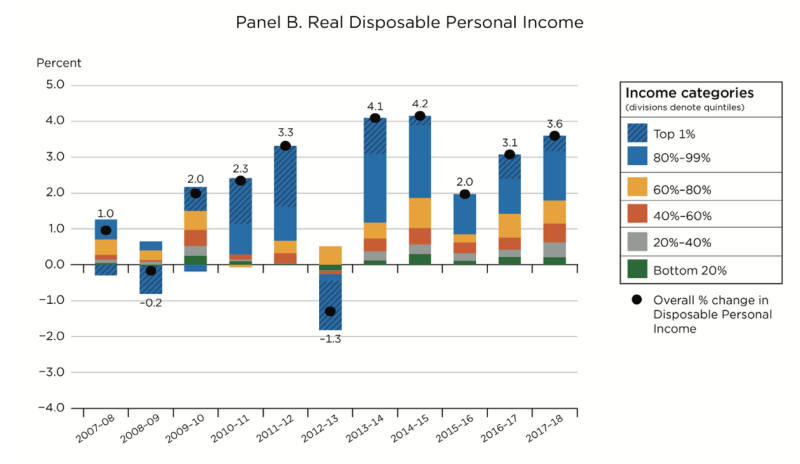Media coverage of the economy ignores the plight of most Americans
By: Alan M. Jacobs, J. Scott Matthews, and Tim Hicks, Eric Merkley (MarketWatch)


Study after study suggests news reporting is biased. Yet the political left scoffs at the idea of 'fake news'. The news media claims to be the watchdogs of democracy. But who is scrutinizing the news media? The news media, like the very rich, regulate themselves. For their own benefit, of course.
For all the socialist zeal of liberal activists, even they ignore the 99 pct. Liberal activists focus the country's attention on the 1 pct. And liberal activists want the country to become dependent upon the fortunes of the 1 pct as a source of tax revenue, job creation, and a redistributed prosperity. Liberalism in the United States depends entirely upon the wealthy.
The foundation of the American Dream is suffering from dry rot. That's a crisis no less severe than climate change that politicians bandy about to score political points and focus our attention on the 1 pct. The biggest threat to democracy is collapse of the American Dream. And the ignored economic data clearly shows that the American Dream is collapsing.

We are apparently living in a time of good economic news. Headlines proclaim that the "US economy is growing at its fastest pace since 1984," trumpet rapid growth, and declare the country to be on a "solid recovery path." Opponents of the American Rescue Plan argued that further government help was unnecessary because of the strong economic rebound.
What the exuberant headlines obscure, though, is that the country's economic upswing is leaving some Americans behind.
While first-quarter 2021 gross domestic product growth numbers appeared to be strong, careful observers have noted that we are experiencing a "K-shaped" recovery, where the rich bounce back but many of the rest of us don't.
While the S&P 500 SPX, +0.19% soared to record highs, fattening investors' portfolios, 44% of those surveyed in a recent poll reported that their household finances remain dented by income losses from the pandemic. Even as GDP recovers, the outlook for many families remains dire.
Tracking the rich
So why all the upbeat economic news? In new research, we show that the news media routinely paint a distorted picture of the economy, one attuned almost entirely to the fortunes of the most affluent. This skewed portrait of the economy has, in turn, left citizens poorly equipped to hold leaders accountable for decades of mounting inequality.
In a well-functioning democracy, when governments make decisions that leave their citizens better off, we expect voters to reward them by returning them to office at election time, and we expect the reverse when elected officials leave most of the public worse off.
But while voters know how their own pocketbooks have fared since the last election, most people turn to the news to evaluate the economy as a whole. But our research finds that reporting on the U.S. economy by the media is highly skewed: Rather than capturing the economic fortunes of most Americans, economic reporting instead tracks how well only the very richest are doing.
Analyzing more than 30 years of economic news articles from 32 high-circulation daily newspapers in the United States, we compared the tone of coverage about the economy with the actual income gains and losses of different income groups. Across the board, economic news is more positive in tone during periods when the top 1% is seeing their incomes rise. Conversely, the economic news is worse when those at the top are facing incomes losses.
In both situations, evaluations of the economy by the news media are almost entirely unrelated to the economic experiences of the bottom 99% when their fortunes diverge from those at the top.
It gets worse.
We also find that rosy economic reporting is more common during periods when inequality increases. Conversely, the media's economic portrait darkens when the assets of the rich take a hit and inequality falls.
Meaning of success
The problem lies with how journalists—and maybe all of us—think about what counts as economic success.
The aggregate rate of economic growth is among the yardsticks most commonly used to track economic performance, along with unemployment and valuations on the stock market SPX, +0.19%DJIA, +0.04%. But over the past few decades, GDP growth has become much less closely tied to the welfare of most Americans.
President John F. Kennedy famously remarked that "a rising tide lifts all boats." But more recent policy choices have created an economy in which the benefits of economic expansion are not widely shared: While real per capita GDP grew by 138% from 1970 to 2019, the real income of the median family grew by a mere 48%.
A news media fixated on GDP growth and other top-line figures will thus miss the real story of how the economy is working for most families.
Other economic data speak more directly to the welfare of the average family. The U.S. Department of Labor's Bureau of Labor Statistics measures growth in median earnings—the earnings of workers in the middle of the wage scale—every three months. The U.S. Census Bureau measures the rise and fall of median incomes as well as the share of Americans in poverty.
And the U.S. Department of Commerce's Bureau of Economic Analysis is now piloting a new measure of how personal income is distributed across the income scale. Together, these measures are more accurate barometers of how the economy is performing for most families.
But these data releases garner comparatively little media attention. Part of that can be explained by the infrequency with which they are released: While GDP is released every quarter, median incomes and the poverty rate are released only annually and with a long delay. It is thus vital that economic agencies do more to prioritize getting data on poverty, the distribution of income growth, and inequality into the public domain more frequently, more rapidly, and more predictably.
Imagine a world in which front pages and cable-news chyrons told us not just how fast the economic pie expanded but also how that pie was divided. This would be a world in which citizens were better informed about who's reaping the most reward from economic growth and who's being left out of an expansion.
It would also be a world in which the officials we elected faced stronger pressure to make sure the U.S. economy actually worked for all of us.
Alan M. Jacobs is a professor of political science at the University of British Columbia, J. Scott Matthews is an associate professor of political science at Memorial University of Newfoundland, Timothy Hicks is an associate professor of public policy at the University College London, and Eric Merkley is a postdoctoral fellow at the University of Toronto.




Nothing to see here. The 1 pct are dong fine. That's what the news reports are telling us.
The 1% will always be ok. I'm certainly not the 1% but it seems like the economy is booming to me. I've been busy through the entire pandemic. I work in construction and have been turning work down because I'm as busy as I want to be.
I agree with the article.
What I dont get is why you always blame "the left" or the Democrats.
-
It has been known and accepted for a long long time that average Americans are very hesitant to criticize the "1 percent" because they aspire to be the "1 percent" one day. Of course we can go way past the one percent and call it the one tenth of one percent, and most Americans do not even want to criticize them or their obscene fortunes. Americans have been brainwashed to believe that if you super rich you must also be a great man (or woman). And this brainwashing has worked since even before US independence.
If the public had the will, we could tax the super rich out of existence, although they would still remain quite wealthy. Instead we allow a system where the richest man on earth , Jeff Bezos, is able to subvert income tax laws and pay less of a percentage of income tax than the people lugging his packages around.
The 99 pct don't have a voice. As the seed points out, average Americans are ignored. Liberal activists view the 99 pct as a tool for concentrating money and power to pursue whatever ideology they want to impose on everyone. Liberal activists are the 1 pct without the wealth.
Go ahead, tax the rich to oblivion. Liberals and Democrats only want to replace the the 1 pct at the top of the economy with the government. What will placing government at the top of the economy accomplish? We'd still be depending upon money trickling down from the top.
Your arguments make no sense, in my opinion.
Liberals have passed virtually all the legislation in our history that was intended to help the lower classes. This is not even really debatable.
Has that legislation been repealed? If the legislation accomplished what was promised then why do we still have lower classes? Why do we constantly need more legislation to address the same issues?
The country is controlled by money and power at the top of the economy. It makes little difference if that money and power is concentrated in wealthy individuals or in government.
The article mentions several positive developments. You on the other hand are as usual bent on being a negatron. Try a dose of Pollyanna once in a while instead of being the bad apple with the aim of spoiling the barrel.